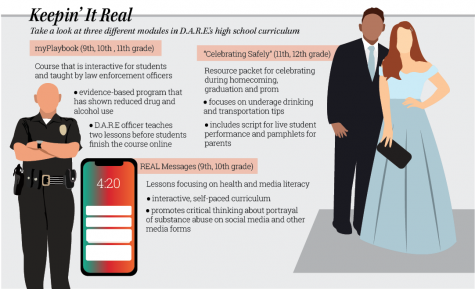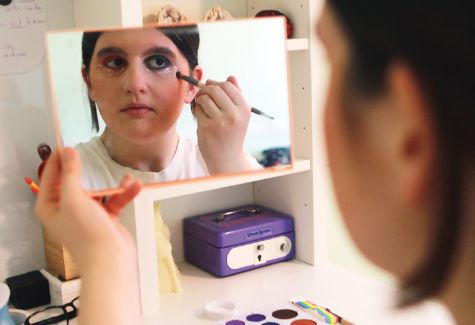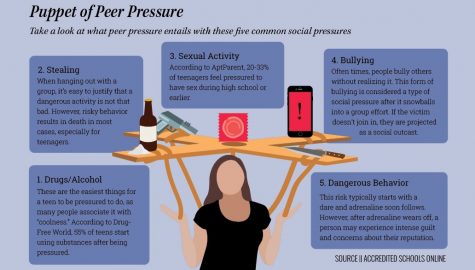Leaving Dare
Feb. 6 ban on flavored e-cigarette sales brings past, present drug prevention programs to attention
Years ago, the Carmel Police Department (CPD) decided to quit the Drug Abuse Resistance Education (D.A.R.E.) program, a nationwide drug prevention program that allowed officers to visit schools in their community and speak to students. The popularity of the program once praised during the ‘80s had begun to wane during the late ‘90s and the new millennium. According to the Washington Post, studies from universities such as the University of Illinois came out concluding that those who joined D.A.R.E were as likely to do drugs as those who didn’t.
According to School Resource Officer (SRO) D.J. Schoeff, CPD’s reasons weren’t as dramatic.
“(We decided to stop the program because of) some challenges we were experiencing with D.A.R.E. and the curriculum and we didn’t think it was really applying to what we were seeing in our community,” Schoeff said. “We felt like we wanted to go a different route with it. So the SRO unit developed our own curriculum.”
According to Schoeff this curriculum and program offered more flexibility and allowed this district to better use its resources to promote drug prevention and school safety. One of the most important benefits the new unnamed program had was something Schoeff said D.A.R.E had lacked in.
“(Under the new program), SROs would actually go to the elementary schools and present on a variety of topics (to students in) kindergarten through fifth grade and also get some curriculum to sixth, seventh and eighth grade. That allowed us to get some face time in front of our elementary students where we were not doing that with D.A.R.E. because we were only teaching D.A.R.E. in sixth grade. We piloted it one year at Carmel Middle School and that was very successful,” Schoeff said.
According to Schoeff, the connection the face time brings is the function of the job as an SRO. Freshman Riya Juneja said she also found this face time to be beneficial.

“I feel like (SROs) definitely make you feel safer here,” she said. “It makes me feel more open.”
Juneja said the connection established through face time such as an auditorium talk on school safety helped to strengthen that feeling. The only potential problems were the subject of the talks themselves. “Maybe it’s too much for (some students) so it starts to get repetitive. It doesn’t really become as relevant anymore,” Juneja said.
Sophomore Chase Havice, who said he hasn’t had an SRO speak to him either face to face or through an auditorium presentation since freshman year, agreed that the presence of the SROs is a positive one and that the talks help. He also said that the subject of presentations or drug prevention programs weren’t perfect.
“I think (the talks are) good, but you can’t change someone’s mind, they’ve got to do it for themselves,” he said.
According to Schoeff however, while important, the subject of the presentations and freedom the new CPD program aren’t the most important benefits brought on by dropping the D.A.R.E. program. “(With) some grade levels it really doesn’t matter what we talk about,” he said. “It’s more about the fact that we’re getting the opportunity to get to know the kids and the kids are getting to know us.”
Both Havice and Juneja said if they encountered a problem they’d sooner go to one of their teachers than an SRO.
“I’ve known them long enough and I trust them,” Juneja said.
But according to Schoeff, the current program has an answer to that as well—the installation of more SROs.
“As we grow that (program) and (once) we have an officer in every single building in this district, having that flexibility and getting those officers inside the classroom to talk in that level is going to be very beneficial,” Schoeff said.
The goal is to establish a relationship between the SROs and students as early on as kindergarten so that trust can expand as time goes on. This is not to replace the teachers as a student’s most trusted figure, but give the SROs more of a presence and most importantly a relationship with students.
According to Schoeff, another benefit the new program brings is the ability to tailor it to the local community and its problems. Because the D.A.R.E. program was a national program, members would create the curriculum, review it, then analyze it, giving officers material a year after a certain drug trend has started.
“One year in drug prevention can make a big difference,” said Schoeff. The unnamed program brought the ability to address local topics like the drug “spice” that may not have been as big on a national level, but were a big issue in Carmel.
Juneja said the subjects covered, particularly related to drug issues, are timely as they talk about problems teens struggle with today. Havice said he agreed as he said that vaping is a big issue teens struggle with today and is something the program touches on.
Schoeff said talks and the trust they create between students and adults are the function of a SRO’s job and the face-to-face contact these talks bring can create safer communities.
“The number one piece is that we bridge the gap between law enforcement and youth,” he said.





